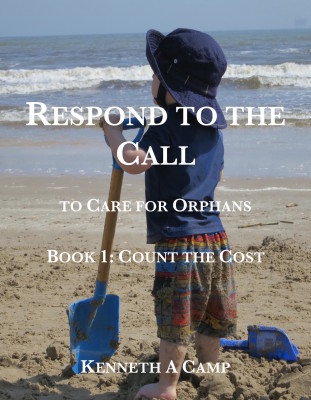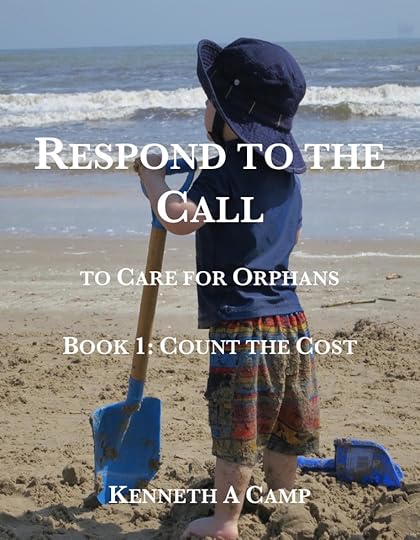Kenneth A. Camp's Blog, page 21
August 28, 2015
7 Reasons to Invest in People

If you invest in or pay attention to the stock markets, you know it’s been a wild ride that the past week or two. Investing isn’t for the fainthearted that’s for sure.

It helps if you can take a long-term approach to financial investments riding out the ups and downs. Some investments will disappoint and others will succeed beyond expectations. That’s the nature of investing.
But that is why some people don’t invest money in the stock market or other opportunities. It’s too stressful.
I follow two rules when I make financial investments:
I don’t carry any consumer debt. I didn’t invest (other than 401K and other retirement funds) until I was completely out of consumer debt.
I don’t invest anything in the stock market or other similar investment opportunities that would ruin us financially if I lost it all.
Yes, wise investing requires good stewardship and a sober mind.
Investing in People
But what about investing in people? What does that look like? Do I approach my relationships as serious as I do financial investments? Am I aware of what I deposit into the life of another? And, should I expect a return on that investment?
Maybe it sounds too impersonal to think of people as investments, but I think that people truly are worthy investments.
Here are 7 reasons why I think it’s good to invest in people:
People Have Value. Every person is of value regardless what the popular culture says. You might not believe that if you think that a person is simply an evolved mass of biology. But, when you believe that each person is the beautiful creation of a majestic God…well, God instills value in every single person. When we have that worldview, then investing in people makes sense because they have inherent value.
People Respond. How you invest in a person depends on your role in their life. You might invest in a complete stranger by simply helping them in a time of need never to see them again. But for most people who you invest in you probably have a relationship with them. When a person invests in another person, whether as a parent, teacher, coach, mentor, or simply a friend, nearly every time that person responds in a favorable way. We all need help, encouragement, hope, nurture, trust, and most of all love. When someone takes the time to make an investment in our lives, we tend to get back up, move forward, and become productive again.
People Reciprocate. When we invest in people, more times than not, that person looks for a way to return the favor. We all are givers and receivers. Those who make investments into other people’s lives always receive back more than they give.
People Pass It Forward. I have seen first-hand how people want to invest in others after someone has taken the time to invest in them. So, when you look at the return on your initial investment in a person, there is a great chance that the return will compound many times over.
It Is Life-Giving. It is inspirational when you invest in another person. Especially when you witness positive outcomes. Many times you get to join them on the journey and rejoice with them when they succeed in life. I don’t know about you, but I find that rewarding and energizing.
It Helps You Grow. When you give something of yourself away, you grow. When you invest in others, you have opportunities to disciple, to lead, to even mourn with them through challenging times. All these things grow you as a person. So in effect, you are investing in yourself as well.
Yes, for a Return. If you don’t expect a return when you invest in people, you probably aren’t really investing in them. We want people to succeed, grow, and have an impact on many others as a result of what we have poured into them.
Yes, people, just like financial investments will disappoint. They will let you down leaving you wondering why you invested in the first place. But I am going to give the same advice that wise financial advisor do. Don’t over-react.
Keep investing! Especially in People. They Are Worth It.
August 25, 2015
When Things Meant to Stay Bonded Together Tear
5 Things I Know Are Still True about God

I sang a rendition of a Twila Paris song at our wedding over 27 years ago—Bonded Together. Originally it’s a love song sung to God, so I slightly altered it and made the person of affection my beautiful bride. I think God (and Twila) was ok with that.

The first verse and part of the chorus goes like this:
Like tightly woven garment, like metal alloy, we are put together in the strongest way. With a common bond to join us that they cannot destroy we are held together in the longest way. And we could not be pulled apart without tearing out a heart. Bonded together…we are bonded together. Bonded Together by Twila Paris
Bonded Together
Two experiences this past week shook me. Both hit me in the same day. One was a relationship. The other a tendon in my ankle. Both torn yet meant to stay bonded together.
A Torn Tendon
I enjoy the sport of basketball and play a lot, but I have struggled with foot and ankle pain for most of 2015. I went in for an X-ray this Spring to see if I had a stress fracture. That came back negative. What I know now is that I had a strained or even partially torn tendon.
After some rest, I returned to the court. Then on a morning in late May on the basketball court, I felt a sharp pain shoot up my ankle and shin. I immediately walked off the court.
Not knowing the extent of the injury, I took a conservative approach to treatment (and because of our wonderful medical insurance system that would probably turned down an MRI until I had some treatment done first).
I did see some improvement, yet it stalled. So, we ordered the MRI that revealed a complete tear of my tibialis anterior tendon. I am told that this tendon tear is very uncommon unlike an Achilles tendon tear or rupture.
So this last week I made a visit to a foot/ankle surgeon.
He informed me that I had two choices—do nothing and live the rest of my life with a torn tendon. Or, schedule surgery to attempt repairing the tendon followed by at least six months of recovery.
I left that appointment in a state of shock. I still am not thrilled about either option. I am also challenged with “what if” and “I should have” kinds of thoughts. Tendons are not meant to tear.
Shaken Sense of Security
As I write this, I don’t know what the outcome will be for my torn tendon. I do know that it will involve much pain through a time of recovery. My tendon may not ever repair. But by the grace of God it may, either by his miracle or after an intense period of hard work, not only completely heal, but become even stronger.
Understandingly, when things meant to stay together rip apart, such as our health, a relationship, or anything foundational in our lives, our sense of security is shaken. But I know One who is never shaken. Not only is His sense of security not shaken, He Is Not Shaken.
I believe this because I Know this to be True about God:
He Remains the Same. When things tatter, tear, even terminate, God is still who He has always been and always will be. He stays that way.
He Heals. From my perspective today, it’s hard for me to see healing for either. But I do know that God is a God who heals. I plead before His throne for this healing.
He Restores. God takes what the enemy means for destruction and is a master at making something new and beautiful from it.
He Sustains. When things tear that should stay tethered, instability moves in. Everything that is except the One who holds all things together.
He Promises. I nor anyone else will ever understand the pain and suffering we face in this life, but He promises us a better day. A day where every tear is wiped away; every body whole; every relationship perfect.
Move in our lives Lord Jesus. We seek Your Healing Touch.
August 21, 2015
Is Your Child’s Action a Sensory Delay or a Behavior Issue?

The challenge with basic parenting books is that they assume that all of your child’s actions are behavior based. In other words, if you parent in the way they propose, your child should respond with appropriate behavior. But what if your child’s “disobedient” action is not behavior related at all?

Your child’s actions very well might be caused by sensory delay. If this is the case, then typical parenting techniques will probably not work. They might even cause more challenges.
Everyone has to process sensory input
We all experience our world through our senses. And even as an adult many of us struggle with processing sensory input.
I struggle with processing audio input like crowded, noisy rooms. I used to think that my struggle was a personality thing. Then I learned that it was a sensory issue. Someone could easily interpret my behavior as non-social, introverted, and maybe even arrogant. But in reality, I withdraw, stand quietly in the corner, or even leave the room simply because I can’t handle the sensory input.
Now before you shake your head at how strange that sounds, think about how you process sensory input. What situations cause you to feel anxious or out of control? Or, what do you do to help you concentrate on a task?
Do you sometimes over-react to a situation and later wonder why you did that? Ever think that you simply had trouble with processing the sensory input?
How can you tell what is the cause of your child’s (or anyone’s child) action?
First of all, please don’t blame yourself if your child suffers from sensory processing challenges. Many different things can attribute to a child’s struggles with sensory processing. If a child has experienced any kind of trauma, especially from pre-natal to one-year-old, that’s a likely cause. But it can also simply be genetic or environmental.
The first thing to do is to correctly identify your child’s action, so that you have the appropriate response. Because if your child’s actions are caused by trouble processing their sensory world, and you attempt to correct “bad” behavior, well let’s just say you won’t have much success.
Here are some resources that might help:
Sensory Checklist
Sensory Processing Disorder Foundation website
Creative Therapies with Marti Smith
The Out-of-Sync Child Has Fun, Revised Edition: Activities for Kids with Sensory Processing Disorder
The video below does a great job of addressing Proprioceptive sensory challenges (your body’s ability to perceive movement and spatial stimulus).
If you are beginning to identify your child’s (or one that you are the teach or caretaker of) actions as sensory delay/challenges rather than behavior issues, first let me remind you to not blame yourself. Now that you understand what the cause is, you can be a part of the child’s path to healing and ability to process sensory input.
You can find a few more resources on my Orphan Care Resource List.
Please leave a comment below if you have any resources you can add.
August 17, 2015
Here Is A Great Way to Support Missionaries

When Danielle and I served in Thailand for six months as volunteer missionaries, we spent a lot of time around long-term missionaries from many sending agencies and parts of the world. We learned first hand about how very few missionaries on the field get consistent and sustained support from “back home”.

I’m not referring exclusively to financial support, but maybe even more importantly, prayer and emotional support.
I asked one missionary, who then had been on the field for over 20 years, who her home church was. Her reply, “Well, we have been on the field for so long that we have lost contact with our church back home.”
I know if I polled a hundred regular church goers here in the U.S. how often they interact with a foreign missionary, any missionary serving on the field…well, not many would answer positively. The longer a missionary family serves overseas, the higher likelihood they too lose contact with anyone of significance back home.
It’s easier today to stay in contact
Not too long ago, like as recent as 15 years ago, a missionary had to rely on letters in the mail (yes that ancient mode of communication) and an occasional phone call. If they had access to a phone, the cost to call overseas was prohibitive.
So, a missionary could go years without much contact with supporters back home. When a missionary went home for furlough or an extended break, they spent much of their time reconnecting with family, friends, and supporters.
The good thing about the time we live in is that it’s easier than ever for the church at home to stay connected with the missionaries she has sent to the field. We have email, social media, Skype, instant messaging, on and on.
However, from my experience even with all the technology and ease of staying connected, far too often, missionaries feel isolated, even forgotten. How can we reverse that?
I think we, those who send, need to intentionally make every effort to support as best we can those who we have sent.
For the Sake of the Name of Christ
If we aren’t intentional in staying connected with our foreign missionaries, we will naturally become distracted with what is right in front of us.
We need someone who will advocate for our missionaries so that we send our missionaries out well. “For are not we who stay behind also living for the sake of the Name of Christ, rather than for the sake comfort, convenience, money, or private ambition?”
If not, we should be.
Missionary Support Teams
Shortly after Danielle and returned from Thailand two families from our church went to the foreign mission field. I knew from experience that we needed to do more to send them well as a church than just a one-time send off. We needed to form teams that helped our church stay connected. After some research, we found a good model to follow.
If you are part of a church that sends missionaries to other parts of the world (I hope you are!), I urge you to consider doing something like this.
Here is a summary of what Missionary Support Teams can look like.
What is a support team? It is a group of people with whom the missionary can be open and honest, allowing them to see their needs, and share their successes and defeats.
Why have a support team? They help to make our missionaries feel understood, and provide them with a committed group who will show them practical love, keep them visible before the rest of the (Your Church) family, and strengthened on the mission field.
What does a support team do? In a nutshell, a support team works together to care for their missionary, striving to meet their spiritual, physical and emotional needs. To a large extent this will happen only to the degree that the missionary is willing and able to make his needs known to the team.
How are support teams formed? Members of a support team are prayerfully chosen by the individual missionary.
Why should your church have missionary support teams? (Your Church) doesn’t just want to “have” missionaries; you want to “send” missionaries in a manner worthy of Christ.
Want to know how to get started?
You can download the full document that I adapted from Bethlehem Baptist Church Nurture Program for Missionary Candidates Handbook, Revised Version 1995.
How to Form Missionary Support Teams
August 14, 2015
You Can Get a Free Kindle Paperwhite! Order Your Copy of Book 1: Count the Cost

Book one of the series Respond to the Call to Care for Orphans goes on sale tomorrow, August 15, for only $2.99! And by sending me a copy of your receipt, you will enter into a drawing for a free Kindle Paperwhite. Will you help spread the word about this book and amazing offer?

This book is for anyone who is or may in the future consider fostering or adopting children. In the book I walk through what I think are important things to consider before making the decision to bring a child into your home temporarily or forever.
I have already gotten great feedback from foster families, adoptive families, advocates, and caseworkers, such as this comment:
I have not read the whole ebook yet but what I have read is awesome. It is spot on. I am not only a caseworker but an adoptive mother to a former CPS kid. You answer so many of the questions I get.CPS Caseworker
You Don’t Have to Wait Until Tomorrow!
You can pre-order your copy right now by clicking here:

Respond to the Call to Care for Orphans: Book 1: Count the Cost
I give you permission…
to share your digital copy with whomever you want for free. That’s right! For Free!
I am so convinced that this book will help many to make a good decision about fostering and/or adopting that I simply want to get it into the right hands. And you can help do that.
Here is some of what you will find in Count the Cost:
What are your expectations and motivations?
What do you bring to the relationship?
What should know before you bring a child into your home (compiled from many who have gone down this road)?
If you are considering foster care or adopting through foster care, do you..
Do you know what foster care really is?
Do you know what a foster child’s life is like?
How will some people react to your decision to foster?
Learn how your decision will not only impact a child, but also the biological family.
After you order your copy, please share about it on Facebook, Twitter and any other social media network you have.
Send me a copy of your receipt via the contact form below, so you can be entered into the drawing for a FREE Kindle Paperwhite.
Then after you read the ebook (you can read it in 1-2 hours), please leave an honest review on Amazon.
[contact-form]
Thank you for helping get the word out about this book!
August 11, 2015
How You Can Get the Attention of God

This is a promise or maybe a revelation of who God is, and what He notices. If you believe that God exists, I bet you want not only His attention, but His reply, His favor, His providence and protection.

We try all kinds of things to get God’s attention. We follow a list of religious rules and rituals. We study. We attend services. We tithe. We pray. We even make sacrifices like fasting.
But, what really commands the attention of God?
You probably know this already—it’s a matter of the heart. The real question here is who do we seek to please with these actions? God or ourselves?
We go through these actions then don’t understand and complain when God doesn’t respond to our cries or requests. “Why doesn’t God notice my sacrifice? Why is He not impressed with my ritual and tithe?”
His reply? Because we really do these things to impress ourselves or others.
Do you want to get God’s attention? Here is what He says to do:
Remove the chains that bind people and the heavy yoke of oppression. People all around us are bound and weighed down by oppression. Some are mistreated because of prejudice, others by greed, and some by simple evil. Do you take action when you notice the oppressed? Do you free them? Do you lessen their heavy load?
Share your food with the hungry and give clothes to those who need them. Do you have compassion toward those who are in need? Or, do you think that they lack because of their own poor choices, laziness, or misfortune, therefore it’s their problem not yours? Here is the kicker…God brings attention to how you respond to the needs of your own flesh and blood. Do you take care of them or hide from them?
Take away any hint of scornful, false, harsh or unjust words. We spend time trying to please God then turnaround and quarrel among ourselves. We mistreat each other. We spread hurtful gossip. I am talking about how Christians treat each other.
Set aside time for God. God set up the Sabbath to not only to give us rest, but as a time to honor Him. When we go about seeking our own pleasure and gain without consistently setting time aside solely devoted to Him, it reveals the true desires of our heart.
How can you know that you have God’s attention?
His favor will be upon you. I am not advocating a prosperity gospel. However, when God’s favor is upon you, you are restored, you have power to overcome, you experience peace, and His glory protects you.
He will answer when you cry out to Him.
He will take away your sadness.
He will guide you through difficult times.
He will restore things in your life that were broken.
He will give you a good reputation.
When I talk about living a sent life, I can’t think of a better reason than this: It is what matters to God.
(if you wonder how I know these things to be true, it’s because He said it. Isaiah 58)
August 7, 2015
How Do You Know Which Way to Go?
3 Ways Most Do It that Aren't Necessarily the Best

My wife knows all too well I enjoy looking at maps. I even got a job once that all I did all day was look at maps. That probably sounds boring to you, but I loved it!

When I drive somewhere new, of course I look at the map to look at different routes, what towns or cities I will drive through, on and on. Have you ever stopped at one of those big travel stores and seen a map on the wall that shows you where you are? If you are like me, not only have you seen them, but you stood there looking at while you waited for others in your group.
Even when I am traveling by plane, train, or some other public mode, I still look at any map I can find. I have flown overseas several times. On most flights, one of the channel on the entertainment screen on the seat back in front of you is a map with an icon in the shape of a plane showing you where you are. Yep, you guessed it. I definitely check that about 100 times during the flight.
The few times my wife and I have cruised, sometimes more than once each day, I end up in the map room for the same reason.
I do like to know where I am going, and the best way to get there if I am the navigator.
Why is that? Why not just hop in the car and head in the general direction I think I am supposed to go and figure it out along the way?
Most would say that’s irresponsible to say the least. How would you ever get to where you wanted or needed to go if you didn’t know the way?
Well…that’s how most of us live life. We wing it with no real idea of how to get from point A to point B. Or, we follow a “map” that’s not the best one to follow. In other words, we many times get to the top of the ladder only to find out it was leaning on the wrong building.
Wing it until you figure it out. A lot of people approach life-like this whether it’s relationships, career, money management. They have no idea how to get from point A to point B, and then they wonder how they ended up where they are.
Trust your own intuition. I used to be terrible at asking for guidance. You know the classic guy who won’t ask for directions or help, because I know I can figure it out on my own. All that is is P R I D E. Doesn’t work very well.
Follow others. This is definitely better than the first two. However, if we aren’t careful about who we follow, we find ourselves at the top of the ladder only to find it leaning on the wrong building.
So what do I think is the best way? It’s a simple truth, but not always easy to follow. At least it hasn’t been in my life, but here it is:
Trust in the Lord in all your ways and lean not on your own understanding. And He will make straight your paths.
Simple truth.
God not only knows the way to go, He is the map maker, route maker, destination maker, and you. He made you. So, He knows what is best for you. No need to wing it.
I definitely am not interested in leaning on my understanding when I can lean on His perspective. I see such a small portion of reality, and even that is jaded. Whereas God is set apart. He sees everything from what is in my past, what really is going on in my present, and He even sees what my future holds. And on top of all that, He knows me better than I know myself.
Yeah, I am going to follow Him. Because, He knows which way to go.
August 4, 2015
15 Ways You Can Pray for Any Missionary

Every missionary I talk to says that consistent, persistent prayer is the most important thing they need. We might not have the means to go or feel called to go; we might not have the resources to support much financially; but we all have the ability to be powerful intercessors for those who do go.

Right now some of my missionary friends face challenges and needs such as these—the loss of a son; discouragement; weariness; separation from family for a few weeks; more financial support, etc.
I know you pray or want to pray for those we have sent to the mission field especially when you are reminded. In case you aren’t sure how to pray for them, here is a helpful list.
Will you spend time interceding for the missionaries you know serving on the field?
Love for God – Overworked missionaries can become service-oriented rather than love-oriented. Pray that your missionaries’ love for the Lord will deepen, and that love for him will always be their prime motivation for service.
Love for Others – Yes, missionaries are human, and just like you, sometimes they have trouble showing love and respect to those “difficult to love” people—either their missionary coworkers or nationals. Pray that the Lord will make your missionaries’ love “increase and overflow for each other and for everyone else” (1 Thessalonians 3:12).
A Deeper Relationship with God – Missionaries’ schedules can become so packed that they might skip or skimp on their time with the Lord. Pray that your missionaries would follow Jesus’ example.
Spirit-Controlled Lives – Just like the rest of us, sometimes missionaries have a tendency to do the Lord’s work in their own energy and human ingenuity. Pray that all of your missionaries’ actions will be under the control of, and by the power of, the Holy Spirit.
The Fruit of the Spirit – As you pray that your missionaries will be under the control of the Holy Spirit, pray that the fruit of the Spirit—the very beauty of Jesus—will be manifest in their lives.
Wisdom and Knowledge – Strong-willed missionaries often come into conflict when two or more of them have opposing viewpoints. Pray that missionaries will have the wisdom of God (James 3:17).
Courage – Imagine your missionaries making the same prayer request Paul did in Ephesians 6:19: “Pray also for me, that whenever I open my mouth, words may be given me so that I will fearlessly make known the mystery of the gospel.”
Receptive Hearts – Pray for divine providence, that the Lord will lead your missionaries to people whose hearts will be open to hearing and receiving the gospel message.
Disciples – Pray that your missionaries will experience the joy of leading others to salvation, and of “teaching them to obey everything [Christ] commanded” (Matthew 28:20).
Strong Faith – The apostles once made a direct request of Jesus: “Increase our faith!” Pray that your missionaries will have great faith that will lead them to ask great things of our Lord.
Steadfastness – Pray that your missionaries will follow Paul’s advice to the Corinthians: “Stand firm. Let nothing move you. Always give fully to the work of the Lord, because you know that your labor in the Lord is not in vain” (1 Corinthians 15:58).
Strong Family – Cross-cultural living can magnify even small family conflicts. Pray that members of missionary families will be drawn together, not torn apart, by living in a new culture.
Protection – Missionaries are prime targets of the enemy. Join Jesus in praying to the Father: “My prayer is not that you take them out of the world but that you protect them from the evil one” (John 17:15).
Material Needs – Missionaries often face harsh living conditions, and may have to struggle to meet basic physical needs. Pray that the Lord will supply all their financial and material needs “according to his glorious riches in Christ Jesus” (Philippians 4:19).
Health and Strength – In today’s increasingly violent world, missionaries face not only sickness, they may also be victims of crime, civil unrest or political upheaval. Pray that the Lord will grant the measure of health and strength that will bring his greatest glory and the greatest good for the missionaries.
You will do well to send them on their way in a manner worthy of God. For they went out for the sake of the Name, accepting nothing from the Gentiles. Therefore we ought to support such ones, that we may be fellow workers with the truth.3 John 6b-8
July 31, 2015
Introducing a New Ebook Series—Respond to the Call to Care for Orphans
Find Out How You Can Get a Free Copy of Book 1: Count the Cost!

What does it take to care for a child that doesn’t have a family? If you were to bring such a child into your family, how would that impact your family? What should you know or consider beforehand?

A wise person counts the cost before making a life-altering decision. Book 1 of this series will help you determine whether fostering or adopting is for you and your family by discussing the following:
What are your expectations and motivations.
What do you bring to the relationship.
What should know before you bring a child into your home (compiled from many who have gone down this road)
If you are considering foster care or adopting through foster care, do you..
Do you know what foster care really is?
Do you know what a foster child’s life is like?
How will some people react to your decision to foster?
How your decision will not only impact a child, but also the biological family.
Book 1: Count the Cost contains vital information to process if you or someone you know is considering foster care or adoption.
The book is launching on August 15th and available only on Amazon.com. You can pre-order your copy today for $2.99 by following this link:
Respond to the Call to Care for Orphans: Book 1: Count the Cost
But you can get a free copy now for only a short time! All you need to do is subscribe to my blog.
If I send you a free copy, all I ask you to do is tell others about it. Share it with your friends on your social media. You can even give them a copy of it if you want!
I will follow up with you asking for you to leave a review on Amazon as soon as that is live and will allow reviews.
Then stay tuned to information about upcoming books in the series:
Book 2: What Do I Do Now? – Any parent feels this way when they bring a newborn baby home, but what about a child who is a complete stranger, one that you know little or know of their history? In this book I will help you with common challenges a family faces after they bring a child from a hard place into their home either temporarily or forever.
Book 3: Trauma Informed Care – Over the past decade or so a lot has been learned about how trauma affects a child. Trauma dramatically alters the brain chemistry of child many times causing behavior that is very different from a child who has not faced abuse, neglect, or abandonment. How we respond to a child with a traumatic history will greatly determine how well they heal from it. We will explore ways to connect, nurture, and correct children from a hard place.
Book 4: How to Support – Ok. So you’re not called to bring a child into your home either to foster or to adopt. However, you are called to care for orphans. In book four of the series I will share many ways you can do that, including ways you can support families who do foster or adopt.
Get Your Free Copy and Please share with those you know are considering foster care or adoption.
July 28, 2015
When Survival Instinct Encounters Love

Any person who has suffered trauma, abuse, neglect, abandonment, etc. learns how to survive. This is especially true if their experience is chronic or ongoing. Even though it doesn’t always look the same, we all have the will to survive. Some shut down, pull in, and seal themselves off from the world trying to protect themselves the best they can.

Others run. Physically or emotionally run away from any perceived danger. Then there are those who fight. They lash out with their fists or words, angrily striking first hoping to avoid anymore pain.
When a family brings a child into their home, either to foster or to adopt, they need to know that they are bringing a child in that is in survival mode. This is true even if the child is only a few months old. And, as they grow older, even if the abuse or trauma was years before, they will implicitly react to perceived danger much more strongly than a child who has not experienced trauma.
The trauma hard-wired their brains at an early age to react this way.
I wish more people understood a child from a hard place. I often get looks when my child responds out of fear. I want to try and explain why he is acting this way. But, I decide that if they are giving me a look, they probably don’t care to know why, they just want me to get my kid away from their kid. And, sometimes that is the best solution.
I wish that I always remembered why my son responds with fear. Or, that I responded more often with patience and understanding. Because when I respond with impatience, frustration, even anger, guess what, he acts out even more. No wonder he does. I probably scare the dickens out of him.
However, when I respond with love…(deep breath)…wow, what a difference.
It’s not always immediate, but the eventual results are amazing and healing.
Recently, my son had a difficult getting ready for bed experience just like many four-year-olds have when they are past tired. But the difference with a child from a hard place is that these experiences often are more intense and last longer.
I tried all of the techniques I have learned like saying “want to try that again with respect?” to giving options so he felt more in control of his environment to defaulting to consequences.
After several minutes of screaming, throw himself down on the ground tantrums, name calling, and even telling me that he didn’t love me and didn’t want to be my son anymore (I thought that was supposed to happen when he became a teenager not a preschooler!), he finally let me pick him up and hold him in the rocking chair.
Yet, he still struggled to calm his anger.
I know it was the Holy Spirit within me. Instead of anger or hurt, I felt overwhelming compassion and love for my son. I held him as tight as he would allow even though he tried pinching my arm. I placed my hand on the side of his face, leaned over and kissed his forward head, whispering, “It’s ok, I love you” over and over.
I could feel him relax in my arms. He clenched his fists a couple of more times before finally melting into my chest, my hand still gently holding his face.
Love conquered fear.
“Do you still love me, Daddy?”, he quietly asked. “Yes, son, I will always love you.”
There is no fear in love, but perfect love casts out fear.1 John 4:18a ESV
If you are the parent of a foster or adopted child, I urge you to find a way to nurture them even in the toughest moments.
And if you interact with those who have a child from a hard place, please understand that that child’s behavior is almost always driven by fear. Your compassion toward that child and parent will act as a healing salve instead of a judgmental look, comment or action.



